Costa Rica is a fantastic destination for environmentally conscious travelers. Not only has the country set aside approximately 25% of its land to parks, reserves, and protected land, but it also leads the world in environmental innovations and initiatives. Costa Rica is working to achieve carbon-neutrality by 2021. So if you are hoping to continue your eco-efforts while out of office, Costa Rica is a great place to do that.
Choose Eco Destinations.
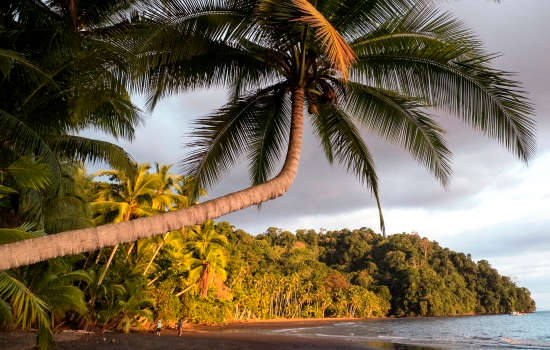
The Golfo Dulce from Playa Cativo Lodge on the Osa Peninsula
While ecotourism a hot topic throughout Costa Rica, there are a few destinations that really shine when it comes to sustainability. The Osa Peninsula and Golfo Dulce in Costa Rica’s southern zone have the wildest and remote rainforest in the country. The Monteverde Cloud Forest, Tortuguero National Park, and the pristine Southern Caribbean Coast also push sustainability to the forefront. The lodges in these remote areas tend to be smaller and lacking in luxury amenities like television, WiFi, and air-conditioning. If the idea of going without some of these everyday conveniences makes you sweat, remember: you’re in the rainforest! There is a whole world of wildlife waiting to explore just outside. Additionally, many of the lodges are situated up in the rural mountainside or by the sea making it easier to catch those breezy ocean tradewinds to keep cool.
Pick Green Leaf Hotels.
In Costa Rica, hotels are rated according to their degree of sustainability by the CST or Certificate for Sustainable Tourism Program. The highest level attainable in the program is five leaves. The CST evaluates each hotel in five different areas of sustainability: physical-biological environment (the relationship between the hotel and its surrounding environment), service plant (how the company handles waste management and light and water saving technologies), service management (how the tourism product fits with market trends and localities), client (customer participation in sustainability programs), and socioeconomic environment (a beneficial relationship between the facility and local community). Certifications are renewed every two years.
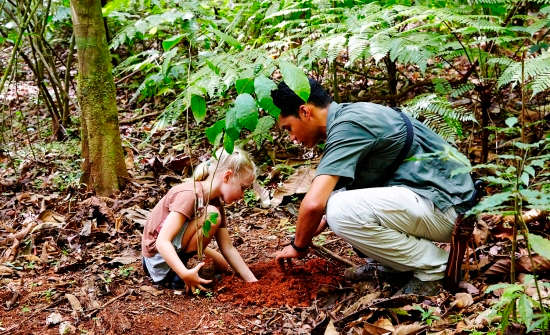
Tree planting at Lapa Rios Ecolodge on the Osa Peninsula
Features that may earn hotels five leaves include utilizing wood from fallen trees in construction, solar heating, oil-based natural paint, rooms fashioned from recycled materials, and residual treatment plants. Tree planting experiences are available at some hotels. Many hotels also have their own gardens and incorporate a farm-to-table or dock-to-table experience into their dining operations. At Lapa Rios Ecolodge, a remote five-leaf ecolodge on the Osa Peninsula, leftovers go to the pigs that live just off the main resort grounds. Biogases from the pigs are then used to operate the staff kitchen! They even offer a tour if guests are interested in their sustainability programs. Many other hotels have banished single-use plastics from their properties.
Learn more on our Costa Rica Eco Hotels page.
Find Alternatives to Driving and Flying.
As you probably know, flying isn’t great for the planet. So when you fly, try to fly direct. Some airlines allow you to purchase carbon offsets, a fee on top of your ticket price which funds environmental projects such as rainforest conservation programs. When you rent a car, try to use compact vehicles.
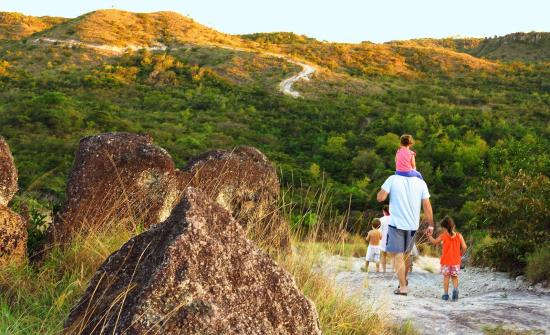
Exploring the trails around Rio Perdido Hotel
One of the most fun ways to explore the mountains or little beach town of Costa Rica is by bike. Many hotels provide complimentary bike rentals. In addition to being green, it’s a fantastic way to get acquainted with a destination at your own pace. Alternatively, biking tours can be arranged if you’d prefer a local guide escort you to the best local spots and viewpoints. Naturally, hiking and walking are other great ways to explore Costa Rica’s diverse landscape. In addition to being more sustainable, it’s better for your health!
Avoid Single-use Plastics.
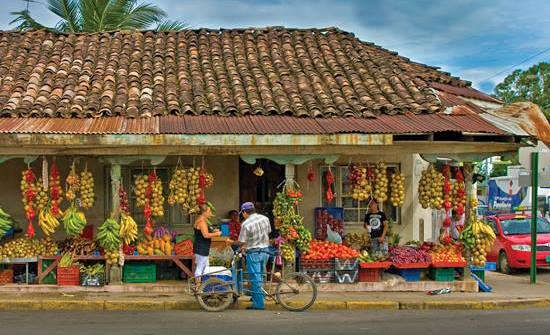
Don’t forget to bring your reusable bag!
It’s the little things that add up! Saying no to single-use plastics isn’t out of the ordinary in Costa Rica and many local establishments have made efforts to eliminate them already. When dining out, ask your server to hold the straw and try to dine in. Don’t forget to bring along a reusable water bottle. Yes, the tap water in Costa Rica is safe to drink. Pack a couple of reusable bags for market visits or to hold your laundry in. Skip the hotel’s little bottles of shampoo and conditioner and bring your own refillable containers from home. Additionally, avoid products with micro-beads and aerosol cans. And as much as possible, recycle.
Pack Light.
In addition to bringing along reusable items, packing light can make transportation more fuel efficient. While it may seem like it would make a minor difference, all those over-sized bags can really add up!
Eat Locally.
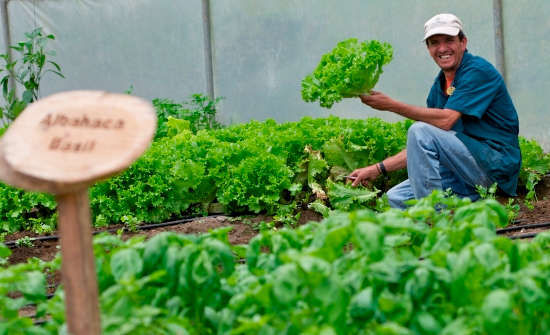
The organic garden at El Silencio Lodge
Farm-to-table and dock-to-dish programs are rising in popularity at local restaurants and hotels in Costa Rica. In addition to being more environmentally friendly, local food is fresher and tastes better. That’s a win-win. Visit local farmers’ markets and look for locally sourced food on grocery runs.
Leave only footprints. Take only memories.
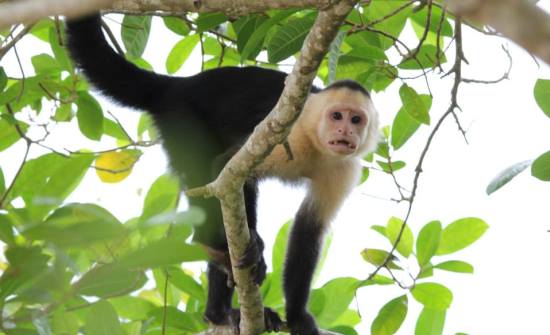
The monkeys of Manuel Antonio are sadly now accustomed to taking food from tourists.
Is there anything more beautiful than an unspoiled paradise? Don’t litter, leave behind food, or feed wildlife. Besides preserving delicate ecosystems, picking up trash and leftover food will make animals less reliant on people and more in sync with their natural behaviors.
Ask What Companies Are Doing in Sustainability.
If sustainable travel is important to you, it’s important to make your values known. The more conversations about ecotourism, the more ideas and innovations spread. Additionally, businesses can focus on what really matters to their customers.
For your next eco-escape, check out our customizable nature and wildlife itineraries or plan your trip with a Costa Rica Expert.
Related Articles:






